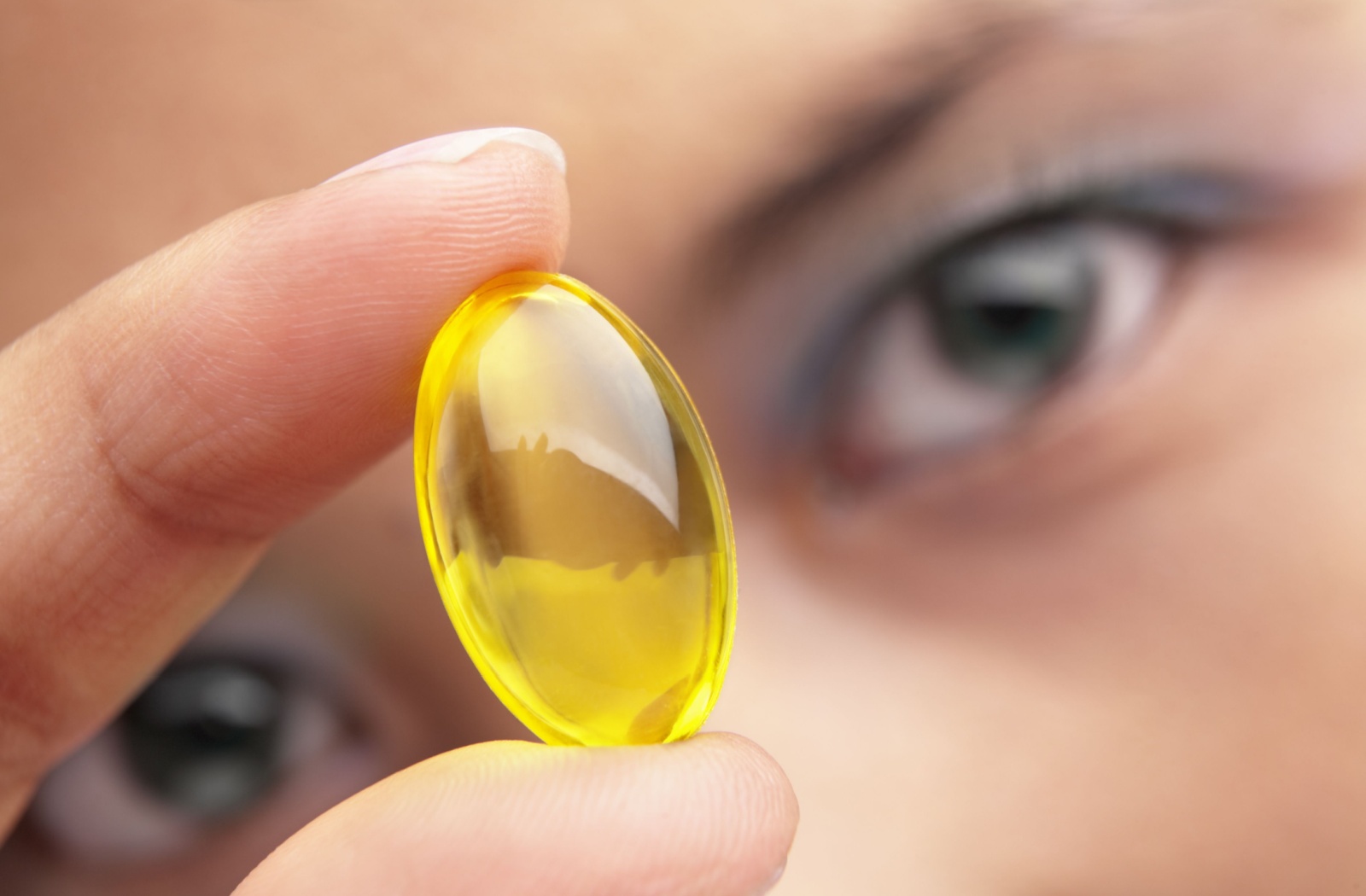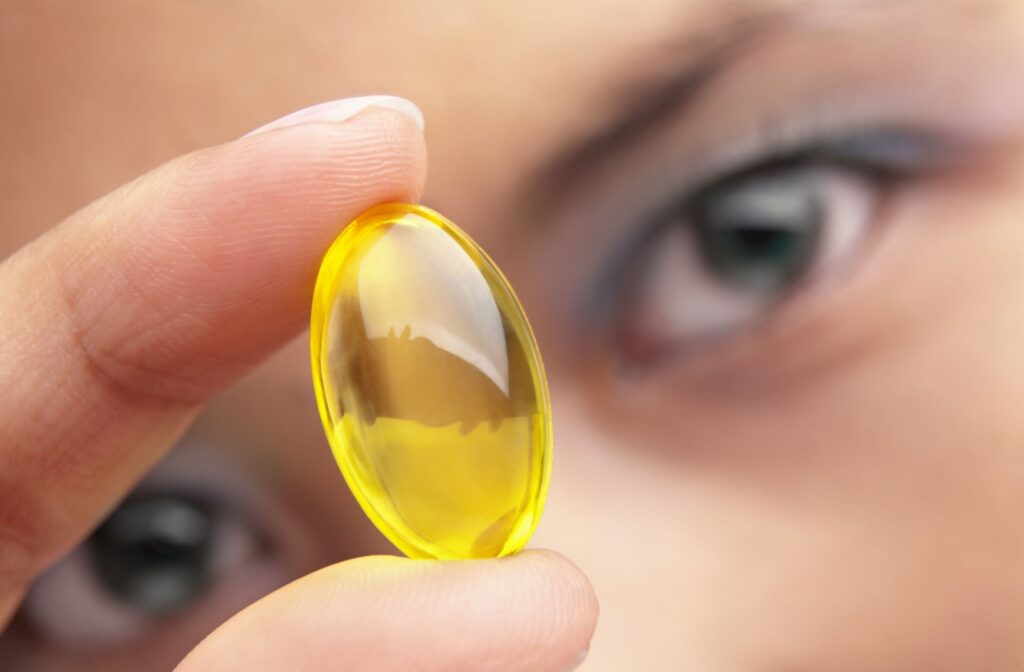Age-related macular degeneration (AMD) is a common cause of vision loss in older adults. Characterized by a decline in central vision, it can make reading, driving, and seeing faces more challenging. However, supplements that contain AREDS2 can help slow down the progression of some types of AMD. There are also treatment options for the late stage of wet AMD.
Regular eye exams can help you and your eye care team identify macular degeneration early, allowing for timely intervention.
What Is Macular Degeneration?
Age-related macular degeneration (AMD) involves damage to the macula, which is a part of your eye that allows you to focus on what’s directly in front of you. AMD affects central vision and symptoms can interfere with everyday tasks like reading, driving, and seeing faces. It’s a common condition and a leading cause of vision loss. There are two main types of AMD: dry and wet.
- Dry AMD: This type of AMD is more common and is characterized by a thinning macula. Typically slow to progress, dry AMD can be early, intermediate, or late-stage. There is no treatment for late dry AMD, but if you have late-stage dry AMD in one of your eyes, supplements can help slow the development of AMD in the other eye.
- Wet AMD: Also known as advanced neovascular AMD, wet AMD happens when abnormal blood vessel growth in the eye damages the macula. Wet AMD progresses faster but is also less common.
It’s important to note that dry AMD at any stage can turn into wet AMD, and wet AMD is always considered late-stage AMD.
Nutrition & Supplements For Macular Degeneration
What you eat can impact the progression of macular degeneration. Eating a healthy diet rich with nutrients is also beneficial to general health and well-being. Always talk to your healthcare team before starting on a new diet or supplements.
Food & Nutrition
A healthy diet can’t reverse AMD or cure it, but eating well may help slow AMD down. Diet can also help patients manage underlying health conditions like hypertension and obesity, which in turn can help slow AMD. A healthy diet should include vitamins A, C, and E, antioxidants, carotenoids, and omega-3 fatty acids. Prioritize eating:
- Leafy green vegetables and colorful vegetables like peppers and sweet potatoes
- Fish, especially oily fish (salmon, tuna, mackerel), which are high in omega-3 fatty acids
- Citrus fruits such as oranges and grapefruit
- Nuts (however, be careful not to overdo vitamin E intake and calories)
Avoid highly processed food, as it can cause inflammation, which is linked to macular degeneration.
AREDS2 Supplements
The National Eye Institute (NEI) sponsored two age-related eye disease studies (AREDS and AREDS2). AREDS2 supplements are believed to help slow the progression of some types of AMD. However, it’s important to remember what supplements can and cannot do:
- AREDS2 supplements can slow down intermediate dry AMD in one or both eyes
- AREDS2 supplements cannot keep early dry AMD from progressing to intermediate dry AMD
- AREDS2 supplements can’t do much for late-stage AMD. However, if you only have late AMD in one of your eyes, supplements may help slow AMD progression in the other eye
- AREDS and AREDS2 supplements shouldn’t be seen as guaranteed cures for AMD
- The above applies to dry AMD. Wet AMD requires other types of treatments
AREDS2 supplements contain the following ingredients:
- 500 mg of vitamin C
- 400 IU of vitamin E
- 2 mg of copper
- 80 mg of zinc
- 10 mg of lutein
- 2 mg of zeaxanthin
- Older AREDS supplements contain beta-carotene. Too much beta-carotene is linked to a higher risk of lung cancer in current and ex-smokers.
This mix of nutrients cannot be consumed through ordinary multivitamins or a regular diet; you must obtain AREDS2 supplements.
Because AREDS and AREDS2 supplements can affect digestion, how other medicines behave, and even other health conditions, it’s important to consult with your primary care doctor and eye care team before starting a new diet or supplements.
Prevention Strategies For AMD
AMD is a common condition that affects 11 million people in the United States. But there are things you can do that, according to studies, may reduce your risk.
Lifestyle Changes
Smoking increases your risk of developing macular degeneration, so consider quitting. There are many resources to help you quit smoking. Check out SmokeFree.gov for tips to get started.
Getting enough physical exercise and keeping your cholesterol and blood pressure levels healthy can also help reduce your risk of AMD. The U.S. Department of Health and Human Services recommends adults perform 150 to 300 minutes of moderate-intensity exercise or 75 to 150 minutes of vigorous exercise per week for significant benefits.
Eating a healthy diet that includes leafy green vegetables and fish also helps with risk reduction.
Regular Eye Exams
Early AMD often shows no symptoms. That’s why regular comprehensive eye exams are so important. Your optometrist can identify macular degeneration through a retinal photography, OCT, or a dilated eye exam. Knowing you have AMD early means you and your eye care team can intervene earlier. Don’t wait for symptoms to show up.
Age, family medical history, underlying conditions, and other factors may influence how often you should get your eyes checked. Always follow your optometrist’s recommendations.
In general, the American Optometric Association (AOA) recommends that adults aged 65 and older get an eye exam every year. Meanwhile, most adults between the ages of 18 and 64 should get an eye exam at least every other year.
Eye Disease Management In Reno, NV
At Dr. Jennifer L. Shane & Associates, we offer comprehensive eye exams for adults, children, and people with diabetes. Our optometrists can also diagnose eye diseases and discuss eye nutrition with you.
Regular eye exams can help you and your healthcare team spot diseases that don’t yet show symptoms. Due for your next eye exam? Book an appointment for you or a loved one today.



